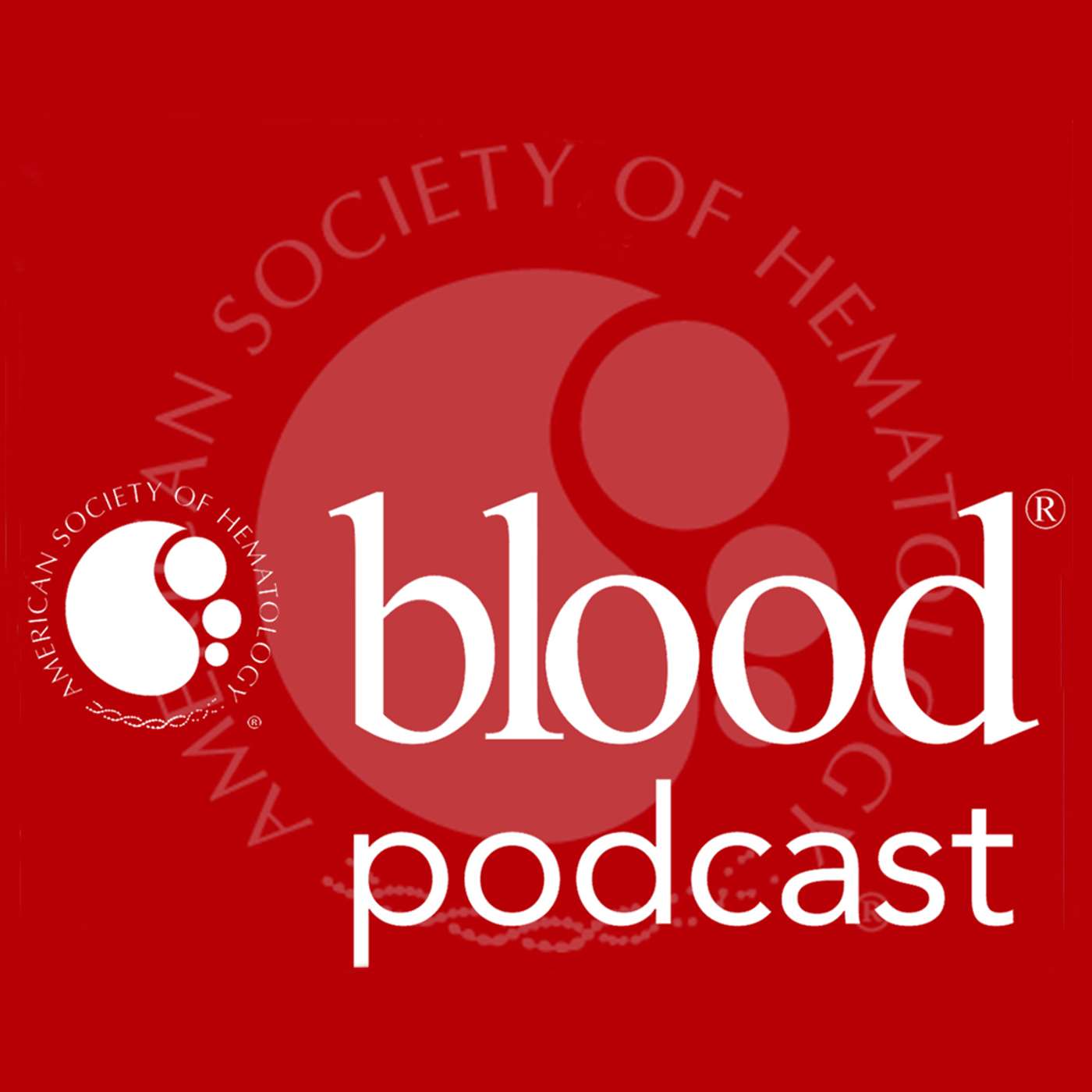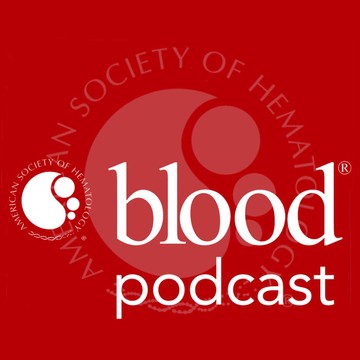

Blood Podcast
American Society of Hematology
The Blood Podcast summarizes content recently published in Blood, the most cited peer-reviewed publication in the field of hematology.
Episodes
Mentioned books

May 22, 2025 • 21min
Clonal hematopoiesis in frequent blood donors, immune microenvironment and bispecific antibody response in diffuse large B-cell lymphoma, and blinatumomab as part of early consolidation therapy in CD19-positive Ph-negative B-cell acute lymphoblastic lymphoma
Discover the intriguing link between frequent blood donation and clonal hematopoiesis in older men, revealing potential mutations in their blood cells. Delve into the immune microenvironment influencing treatment responses in diffuse large B-cell lymphoma, uncovering how these biological variations can predict patient outcomes. Additionally, explore the promising role of blinatumomab in enhancing therapy for CD19-positive acute lymphoblastic leukemia, showing significant benefits for minimal residual disease clearance and overall survival.

May 15, 2025 • 32min
How I Treat Transfusion Medicine (part 1)
In this discussion, Drs. Masja de Haas, Helen Savoia, and Stella Chou share insights from their work in transfusion medicine. Masja focuses on non-invasive prenatal testing for alloimmunized women, while Helen emphasizes managing pregnant patients with red cell antibodies. Stella highlights the complexities of transfusion needs in sickle cell disease, addressing the urgency for compatible blood supply. The trio delves into innovative strategies to enhance patient care and safety, creating a compelling narrative around the challenges and advancements in their field.

May 15, 2025 • 18min
Discontinuing lenalidomide maintenance in MM; congenital neutropenia syndrome linked to COPZ1 mutations; low GVHD rates with ruxolitinib after allogeneic HCT
In this week's episode, we'll learn about stopping myeloma maintenance therapy in the modern era. New research suggests that many patients in remission can discontinue lenalidomide, remaining treatment-free, without jeopardizing disease response. After that: a novel congenital neutropenia syndrome. Mutations in the COPZ1 gene impact myeloid differentiation and development of neutropenia. Researchers describe the mechanisms and propose a treatment strategy for restoring granulopoiesis. Finally, ruxolitinib maintenance therapy after allogeneic transplant. In a phase 2 study, this treatment strategy was associated with low rates of chronic graft-versus-host disease. Investigators say the use of JAK inhibitors in this context warrants further study.Featured Articles: Sustained bone marrow and imaging MRD negativity for 3 years drives discontinuation of maintenance post-ASCT in myelomaA new severe congenital neutropenia syndrome associated with autosomal recessive COPZ1 mutationsLow rates of chronic graft-versus-host disease with ruxolitinib maintenance following allogeneic HCT

May 8, 2025 • 20min
Measurable residual disease and maintenance therapy in acute myeloid leukemia (AML), stemness and chemotherapy resistance in AML, and effects of babesiosis on red blood cells in sickle cell disease
Delve into how measurable residual disease is pivotal in guiding therapy choices for acute myeloid leukemia, particularly with FLT3-ITD mutations. Discover the intriguing link between stemness and chemotherapy resistance, shedding light on relapse rates. Plus, learn about the effects of babesiosis on red blood cells in sickle cell disease, including how it affects deformability and oxygen transport, highlighting significant health implications for affected individuals.

May 1, 2025 • 18min
Uniquely programmed blood stem cells in the human lung; inclusive molecular classifier for DLBCL; new insights on NETs in the liver vasculature
In this week's episode, we'll hear about how researchers look toward the lung, and find uniquely programmed blood stem cells. This study is the first to fully characterize hematopoietic stem and progenitor cells in the adult human lung. After that: researchers develop a neural network-based probabilistic classifier, DLBclass, that assigns all diffuse large B-cell lymphomas into one of five genetic subtypes. It’s an inclusive taxonomy that they say provides actionable genetic information in almost all patients with DLBCL. Finally, new insights on NETS, or neutrophil extracellular traps. In the liver vasculature, NET removal leads to secondary inflammation, resulting in new waves of NETS that may impact future infection. We’ll review these and other findings from this recent mouse model study.Featured Articles:Decoding functional hematopoietic progenitor cells in the adult human lungDLBclass: a probabilistic molecular classifier to guide clinical investigation and practice in diffuse large B-cell lymphomaDonor regulatory T-cell therapy to prevent graft-versus-host disease

Apr 24, 2025 • 19min
Phosphoseryl-tRNA kinase inhibition in acute myeloid leukemia (AML), APOE gene variants and post-hematopoietic stem cell transplant outcomes in AML, and the role of chronic inflammation in sickle cell cardiomyopathy
In this week's episode we’ll learn more about how phosphoseryl-tRNA kinase inhibition promotes cell death in acute myeloid leukemia, or AML; APOE gene variants and their association with post-hematopoietic stem cell transplant outcomes in AML; and pathways by which chronic inflammation and oxidative stress may lead to cardiomyopathy in patients with sickle cell disease.Featured Articles:PSTK inhibition activates cGAS-STING, precipitating ferroptotic cell death in leukemic stem cells Common Hereditary Variants of the APOE Gene and Posttransplant Outcome in Acute Myeloid Leukemia 17R-Resolvin D1 Protects Against Sickle Cell Related Inflammatory Cardiomyopathy in Humanized Mice

10 snips
Apr 17, 2025 • 39min
How I Treat Myeloproliferative Neoplasms
Join experts Andreas Reiter, a professor specializing in myeloid lympho-neoplasms, Claire Harrison, who co-authored key research on treating low-risk polycythemia vera, and Aaron Gerds, a doctor focusing on anemia in myelofibrosis. They discuss groundbreaking advances in treating myeloproliferative neoplasms, highlighting the importance of personalized medicine. Learn about evolving strategies for managing polycythemia vera, the complexities of anemia treatment, and the significance of thorough testing for rare conditions. Their insights pave the way for enhanced patient care.

Apr 17, 2025 • 19min
The decline of transplant for relapsed myeloma; DDAVP response in bleeding disorders; dual DOT1L/EZH2 targeting in DLBCL
In this week's episode we'll learn about the role of autologous transplant for relapsed myeloma. In an updated analysis of the GMMG ReLApsE trial, salvage autologous transplant offered no survival benefit compared to control chemotherapy. These findings may have clinical implications in an era of alternative, and highly effective, treatment options. After that: Response to DDAVP, or desmopressin, in bleeding disorders. This study is the first large scale meta-analysis to assess the response rate to DDAVP in bleeding disorders. Authors provide new insights into determinants of response, which vary according to the disease type. Finally, turning to diffuse large B cell lymphoma. Germinal center B cells depend on the activity of DOT1 and EZH2 to maintain their pro-proliferative identity. New research shows that combined treatment with DOT1L and EZH2 inhibitors has synergistic activity in vitro.Featured Articles:Salvage autologous transplant in relapsed multiple myeloma: long-term follow-up of the phase 3 GMMG ReLApsE trialDDAVP response and its determinants in bleeding disorders: a systematic review and meta-analysisTargeting DOT1L and EZH2 synergizes in breaking the germinal center identity of diffuse large B-cell lymphoma

Apr 10, 2025 • 21min
Interleukin-1 signaling pathways in myelodysplastic syndromes, the immune checkpoint regulator VISTA as a target in graft-vs-host disease, and epcoritamab plus chemotherapy in transplant-ineligible relapsed/refractory diffuse large B-cell lymphoma
In this week's episode we’ll learn about the role of interleukin-1 signaling in the bone marrow microenvironment in the development of myelodysplastic syndromes, the immune checkpoint regulator VISTA as a potential target for preventing graft-vs-host disease, and epcoritamab plus gemcitabine and oxaliplatin in transplant-ineligible relapsed/refractory diffuse large B-cell lymphoma.Featured Articles:IL-1R1 and IL-18 signals regulate mesenchymal stromal cells in an aged murine model of myelodysplastic syndromesTargeting cell-surface VISTA expression on allospecific naïve T cells promotes toleranceEpcoritamab plus GemOx in transplant-ineligible relapsed/refractory DLBCL: results from the EPCORE NHL-2 trial

Apr 3, 2025 • 15min
Aging platelets shift to proinflammatory function; Odronextamab bispecific antibody therapy after CAR T in DLBCL; prizlon-cel, a novel bispecific CAR T, in B-NHL
Discover how aging platelets evolve from promoting blood clotting to playing a role in inflammation, which may impact transfusion practices. The discussion also explores odronextamab, a promising therapy for patients with diffuse large B-cell lymphoma who have not responded to CAR T cell treatments. Plus, dive into findings on prizlon-cel, a new CAR T-cell product targeting specific antigens, highlighting advancements in cancer therapies and their potential implications for patient care.


